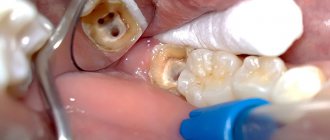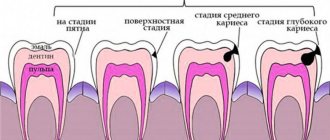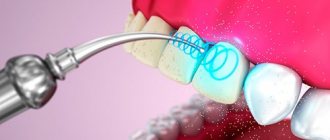The procedure for providing dental care under compulsory medical insurance
To treat teeth for free in non-profit dental clinics, you need to present your passport, SNILS and compulsory medical insurance policy at the reception.
To make an appointment with a dentist you must:
- Join the clinic. To do this, you will need the same passport, compulsory medical insurance and SNILS. The patient's outpatient card will be kept at the reception desk.
- Take a voucher to see a doctor. You can make an appointment with a dentist at the reception desk, by phone, through the government services portal, or through the website of a medical organization.
- Visit a dentist. You can only see a surgeon by referral. First, the examination is carried out by a dentist. If there are indications for wisdom tooth removal, the patient is referred for surgery.
Medical tourism or which country is best for dental treatment?
There are many reasons why people travel long distances for dental treatment. Some tourists are looking for cheaper dental care, while others cannot find quality dental care in their city and must travel long distances to find quality services or the most experienced technician to install braces.
You can choose a dentist outside your area, but within your country. Particularly for cosmetic dental treatment, given that cosmetic dentistry can be expensive.
People looking for a cosmetic dentist may also want to look at dentists who practice abroad. Mexico, in particular, is becoming increasingly popular for tourists seeking dental treatment. There are several reasons why treatment is more affordable in Mexico: materials costs are low, many practitioners are not required to carry insurance coverage, and in some cases, dentists use less advanced and therefore cheaper technology.
Although dental treatment abroad may be cheaper, it also carries an increase in the number of associated complications and risks.
This is associated with a higher risk of swelling and infection. Complications such as infection may require a second visit to the dentist. Although dentists in your city may be equipped to perform the secondary examination procedure, they may not be aware of the approach of the dentist who treated you abroad or the type of technology or devices used. These factors can complicate the secondary examination procedure.
Dentists abroad will provide you with a list of recommendations that must be followed in order to reduce the risk of complications from dental treatment. Most often, normal activities can be resumed after the procedure is completed, but in some cases the person may not be advised to exercise, fly, swim, or drink alcohol for some time. In other words, post-dental treatment may be too much of a hassle for some travelers. It is difficult to predict recovery time while the procedure is being performed, which makes planning a vacation especially hazardous.
Some countries may not have organizations designed to oversee the qualifications and credentials of dentists. Thus, the education of dentists in other countries may be very different from the education of dentists in your country. Once you become a dentist, you need to constantly undergo additional training in order to be a good specialist. Many clinics abroad are privately owned and therefore not necessarily subject to certification.
If you are traveling abroad for dental treatment, here are some tips to help you avoid some mistakes:
Ask how you can verify a particular dentist's background and qualifications.
Be prepared for possible complications. If a complication occurs after returning home, who will continue treatment? If additional procedures are needed later, who will perform those procedures? Visit several dentists in your area to cover all your options.
Before you return home, be sure to pick up your dental records. You should know how the dentist performed the procedure and the type of device and materials that were used, such as in the case of a dental filling, documentation indicating the specific material used by the dentist.
Ask about their infection control practices, using new gloves for procedures, using sterilization of instruments, using disposable syringes for each patient, and sanitizing water during treatment.
What services do you not need to pay for?
Consultations with a dental therapist and dental surgeon are available under the compulsory medical insurance policy. In addition to them, the list includes the following services:
- scheduled inspection, which is required once every 6 months;
- treatment of caries and pulpitis using domestic filling materials;
- removal of tartar;
- treatment of periodontitis, inflammatory diseases of the oral cavity and gums;
- the use of fluoride-containing drugs to reduce tooth sensitivity;
- tooth extraction according to indications;
- treatment of alveolitis, pericoronitis;
- reduction of dislocations and subluxations;
- anesthesia;
- treatment of wounds in the oral cavity;
- opening of abscesses, removal of benign neoplasms;
- treatment of diseases of the salivary glands;
- physiotherapeutic procedures;
- X-ray examination.
Related article: Hysteroscopy under compulsory medical insurance policy
Note! Under the compulsory medical insurance policy, you can remove any permanent or baby tooth for free; both simple and complex surgical interventions are performed.
The clinic will have to pay for expensive imported filling material, for the manufacture of implants, consultation with a periodontist and orthodontist, for teeth whitening and other aesthetic dentistry services.
You can read more about dental services under compulsory medical insurance here.
Is it possible to remove a wisdom tooth under the compulsory medical insurance policy?
Surgical interventions in the oral cavity are equivalent to surgery. Regardless of the complexity, they are covered by the insurance policy. That is, according to compulsory medical insurance, wisdom tooth removal is free. However, it is necessary to take into account the nuances.
If you just come to the clinic and demand that your wisdom tooth be removed, then even despite your insurance policy, you will have to pay for the service out of your own pocket. Why is that? To remove a wisdom tooth under compulsory medical insurance, there must be medical indications and a referral from a doctor is required.
Important! Before removing teeth, it is worth finding out which services are paid and which are free. This list may differ in a particular dental clinic.
What is needed for removal
Removal of any tooth, not just wisdom, is carried out only according to indications. The patient's wishes are not enough.
When figure eights emerge, the jaw is already formed, so there is not enough room for them. Because of this, neighboring teeth suffer, and the wisdom teeth themselves quickly deteriorate and collapse.
Indications for removal:
- tooth decay;
- strong pain;
- formation of an abscess, swelling of the gums;
- incorrect position;
- eruption under adjacent teeth;
- caries;
- incomplete tooth eruption;
- close location of the roots to the maxillary sinus;
- malocclusion.
If such problems exist, removal is carried out free of charge under the compulsory health insurance policy.
A referral for surgery to the Department of Oral and Maxillofacial Surgery is issued by a dentist at the clinic at your place of residence. If complex intervention is required, the patient is sent to the hospital. After the tests are completed, surgery is performed.
Related article: Basic principles of compulsory medical insurance implementation
Reiter
Some people think about the cost of treatment at the dentist and try to look for the most favorable conditions. Not everyone is able to immediately find cheap dental treatment, as people are afraid of going to a bad specialist and believe that they cannot save on their health. This is not entirely the right approach and you can also find a good specialist for little money.
If you know who you are going to, that’s already half the battle and you don’t have to worry when all the information is confirmed by your friends who have already had experience communicating with this doctor and this clinic.
It is much more difficult to find a dentist about whom you still know nothing and choose a clinic based on your own conditions. You need to process a lot of information, find out reviews and look at prices, and this can take a lot of time.
We see that there is now quite a lot of advertising, which is quite well distributed in every corner of the city, and many centers offer favorable conditions for dental treatment and cheap prices in some areas.
It is advisable to check any information and then write your own review that characterizes this place.
How modern doctors advertise
Many doctors resort to their own advertising, which significantly increases the demand for services from a given doctor. Advertising for dentists can be very different: contextual advertising on the Internet, banner advertising, developing your own medical website, advertising on radio and television. If it is difficult for doctors to independently engage in their own advertising, then special agencies have been created for them, where you can find any marketing service.
It is quite obvious that now is the time for cheap treatment at the dentist, when there is no need to overpay and many people are trying to look for favorable conditions in different medical clinics.
How to cure teeth cheaply:
- 1.
Find a cheap dentist who will not raise prices several times; - 2.
Contact a dental clinic that provides economy-level services; - 3.
For some services, you can go to a public clinic, which offers free dental services.
How to choose a clinic
You have probably resorted to services from the field of dentistry and you had to look for a clinic that will fully meet your needs. This has its own difficulties and its own simplicity. The difficulties lie in the difficulty of finding specialists who will work cheaply so that the treatment is quite pleasant. Not only is it difficult to find a cheap dental clinic, but it is also difficult to find a doctor who will work for that kind of money.
Many dentists want to earn money and they try to look for medical centers that pay fairly good money. If a doctor is a candidate or doctor of science, then he will not work for money that is below a certain level. This is the difficulty: you can find cheap dental treatment, but the doctor may not be of a high dental standard.
It is very good to find a “golden mean” where good doctors work and treatment is cheap. Some people may become disillusioned with medicine and stop searching, but this cannot be done and specialists are everywhere.
It is important to choose not only a doctor, but also a clinic, which must be of a certain level. Some patients complain that they have seen private clinics of this level that are scary to enter: quite dirty, old renovations, rude administrators and poor level of treatment.
Cheap dental treatment
If you are offered a profitable offer for dental treatment and you saw this offer on an advertising brochure, carefully read this service and check it for all hidden situations. We already said that promotions can only include the price for the treatment of one thing and materials may not be included in the cost of treatment. Some clinics specifically lure patients with low prices, and then try to keep the person in the clinic and offer him additional services that were not initially stated in the offer.
You can have your teeth treated cheaply with health insurance when your employer has arranged special treatment conditions for you. Typically, health insurance covers dental caries treatment and dental hygiene. It is quite difficult to find an employer who will pay for expensive dental prosthetics, implantation or orthodontics.
The quality of treatment under insurance is a lottery, since clinics operate with fairly cheap materials and not all doctors are willing to work for a percentage of 1,000 rubles, which the employer transfers to the clinic (a fairly common price that our doctors who worked in another clinic had to deal with) .
We do not rule out that there are higher prices that are agreed upon with the employer, but you cannot hope for free installation of braces or implants.
Opportunities for dentists
You should always remember that not all dentists have the ability to treat you at the world level: some lack knowledge, and others lack the equipment that clinics should have to provide this type of service. Sometimes dental clinics purchase fairly cheap equipment and offer corresponding prices. These prices are associated with a limited list of services provided by the clinic, and not with special promotions.
Dentist training takes place on an ongoing basis and you need to study a large amount of the latest literature in order to always be in professional shape. If a doctor limits himself to one thing, then he will certainly lose ground after some time, since the method may become outdated, and demand from patients will shift towards more modern technologies.
You must remember that you can get cheap dental treatment not only in cheap clinics, but you can also get a similar offer in an expensive dental clinic that decided to give a good discount.
Are you used to saving money and are you interested in cheap dental treatment? There can only be one answer: Reiter Dentistry! Our prices are our specialty and this significantly sets us apart from other clinics. We will be able to choose dental treatment for you at a cheap rate while maintaining a high level of service.
Which clinic can I go to?
You can have a tooth removed for free in public and private clinics that provide compulsory medical insurance services.
List of medical organizations that you can contact for wisdom tooth removal:
- “Dentistry on Proletarskaya”, Nizhny Novgorod;
- dental clinic "NAVA", Moscow;
- "Doctor Smile", Moscow;
- LLC "Dentistry 20", St. Petersburg;
- "Hummingbird", Izhevsk;
- JSC "City Dentistry", Kazan;
- LLC "Dentistry", St. Petersburg;
- City dental clinic No. 1, St. Petersburg.
The full list can be found on the website of the Russian Ministry of Health.
How to treat teeth in a private clinic for free
First, you need to find out which private clinics operate in the compulsory medical insurance system. Then contact the one you like, taking with you your passport, SNILS and insurance policy. After joining the clinic, the patient will have access to free compulsory medical insurance services.
The treatment process is similar to that in a public clinic:
- Join the clinic.
- Make an appointment with a doctor (by phone or at the reception).
- Get on the waiting list. You must be prepared for the fact that in a private clinic they will primarily serve patients for money. Although the state covers the costs of treatment for the insured, the funding is small. According to the compulsory medical insurance policy, patients can wait for their turn from two weeks to 2-3 months.
- Come to the dentist for an appointment. To remove a wisdom tooth, you first need to see a therapist; perhaps you can do without surgery. If surgery is necessary, you will need the help of a surgeon.
If the patient is not satisfied with the quality of service or other complaints arise, he has the opportunity to change the clinic once a year.
And I'm going to get my teeth...
Due to the economic crisis in the country, dental tourism is becoming increasingly popular. Is it profitable or not to treat teeth in other cities and what are the advantages of treatment abroad?
Your own dentist
Few of us do not know problems with teeth. But as soon as they arise, the question immediately arises of where to find a good doctor and which clinic to go to. There seems to be no shortage of them, but what confuses me most is the issue of price and quality of this service. In the capital's private clinics, the prices are such that you want to immediately put your teeth on the shelf. The treatment costs a pretty penny. And in many city clinics, when it comes to more complex services, this is also expensive. Especially if it is related to prosthetics and implantation.
Somehow culture does not allow us to follow the example of the British. There, as the English media report, due to rising prices for dental services, a fashion has emerged to treat teeth on your own. Yes, yes, don't be surprised! For example, Ian Boynton, a 42-year-old Gulf War veteran, is one of many who decided to get dental treatment without the help of a dentist. Since 2006, he has removed 13 of his teeth using metalworking tools. Mr. Boynton explains this by saying that over the past 8 years he has tried to get appointments at 30 different dental offices without success. He eventually decided to self-medicate rather than pay £100 to have the tooth extracted at a private clinic. At the moment, Ian Boynton has only two of his teeth left, and he cannot find money for prosthetics.
And this is not the case only in England. Most people in the world prefer not to go to the dentist at all.
A recent study published in the Journal of Dental Research found that about 2.4 billion people in the world live with tooth decay. Considering that it is better to live with bad teeth than to spend money on their treatment. So this problem is relevant not only for Russians. The same English, for example, where dental services are considered the most expensive in the world, were the first to develop dental tourism and went to different countries for dental treatment. For example, to Croatia, where the cost of dental treatment and prosthetics is several times cheaper than in the UK. Residents of the Far East have long been going to China for dental treatment, since services there are several times cheaper, and doctors have long learned Russian and know the needs of Russian patients.
Muscovites also go to get their teeth treated in all directions. Those who have more money go to Europe. But due to the rising exchange rate of the dollar and euro, this is becoming increasingly unaffordable. Those who have very little money go to Ryazan, Tula, Tver, Yaroslavl or Belarus. This service is now actively developing in the Baltic states. It’s even better to go for treatment to those cities where there are trusted doctors you know. Because in our medicine there is nothing more reliable than your own person in medicine.
Is dental tourism worth it?
Pros of dental tourism
Supporters of this phenomenon are confident that there is nothing terrible about this phenomenon. In the provinces, doctors are no worse than in the capital; the equipment and materials are now approximately the same everywhere. Mostly imported. Hence, by the way, dental services have risen sharply. But in the capital, in addition to this, huge prices for renting premises are added, due to which the cost of treatment automatically increases. In Ryazan, for example, it is an order of magnitude lower. Accordingly, the prices for treatment in the price lists are half as much as in the capital.
There are even specialized travel companies in Moscow that organize groups of tourists for dental treatment trips. And Rostourism is confident that this is one of the most promising areas in the tourism industry. There is an opportunity to combine business with pleasure. Take a walk through the sights of Yaroslavl or Ryazan, and at the same time improve your health. The trip is fully organized, with delivery to the hotel, then to the clinic, and then they will organize a tour of the city. Service in our province is improving markedly from year to year.
What services will you be offered? The same as in the capital. They will work with you according to an individual plan and promise to select the most highly qualified specialists. It is clear that if you need long-term treatment, one trip will not do. But the trip itself can be either a one-day trip or take 2-4 days. With a full package of comprehensive services and treatment. In Yaroslavl and Ryazan, special clinics have even been created for Muscovites, where they focus on the higher demands of clients. And the prices are local. Such clinics are not even particularly advertised, since those who have visited them simply recommend them to their friends and acquaintances. And again, if you decide to go to another city, it is better to go to a trusted specialist. Being confident that he will certainly help you. After all, what do people expect from dental and any medical tourism, first of all? Lower cost of services, more professional approach to treatment, attentive attitude and participation.
Cons of dental tourism
Experts are confident that before going to another city for treatment, you need to weigh the pros and cons. What if a complication arises during treatment, and you won’t be able to get to your doctor right away? Then no money saved will be a joy. And you can’t go to the doctors in Ryazan every time.
Treatment abroad can be complicated by the fact that doctors in not all countries speak Russian and you will not be able to explain exactly what is tormenting you and you will not know exactly how the treatment is going.
By the way
Here's some good news for Muscovites. Recently, the capital's vice-mayor Leonid Pechatnikov said that more than 60 dental clinics would be opened in Moscow, where local residents would be provided with free medical care. According to Pechatnikov, there is now an oversupply of dentists in the capital, and they work exclusively at the expense of their clients.
Interesting facts from the field of dentistry
It turns out that people started filling teeth more than 6.5 thousand years ago. The oldest filled tooth was discovered by an international team of researchers from Italy and Australia in what is now Slovenia. Upon careful examination, using
Using infrared spectroscopy, scientists found that the cavity in the tooth was filled with beeswax. Using radiocarbon dating, it was found that the age of the fossil is about 6.5 thousand years.
Another discovery by scientists indicates that people began installing the first implants more than two thousand years ago. During excavations of a Celtic settlement, a skull with an inserted tooth was discovered. This is the oldest false tooth found in Western Europe. The implant matched the size and shape of the incisor on the upper jaw and was found among the remains of natural teeth. According to scientists, a “crown” made of wood or ivory was probably placed on top of this iron false tooth.
But the most amazing discovery related to dentistry was discovered in St. Petersburg. Archaeologists have discovered a woman's dental prosthesis, likely belonging to a Russian aristocrat of the early 20th century. The prosthesis was custom-made and made of platinum and gold in the workshop of the jeweler Faberge. The lady apparently belonged to the local nobility, and the tooth itself is a work of art.
Photo: YAY/TASS
What you need to know before surgery
Before surgery, you need to find out what is paid and what is free under compulsory medical insurance. It is important to know that you will have to pay extra for some related services, for example, for anesthesia, consumables, and x-ray film. As a rule, this is a small amount, but you need to take the money with you for the operation.
Important! All medications included in the vital list are provided free of charge. These are lidocaine, novocaine, arsenic and arsenic-free drugs. Also included in the free list are consumables (bandages, cotton wool, syringes) and filling materials.
It is necessary to ask your doctor in advance about possible risks and complications after wisdom tooth removal. Negative consequences include increased body temperature, swelling of the gums, the appearance of a cyst, bruises on the cheek, and pain when opening the jaw. The most dangerous complication that requires emergency medical attention is severe bleeding.
Related article: Is removal of papillomas included in the compulsory medical insurance policy?
All services included in the compulsory medical insurance program must be provided free of charge. If they demand money from a patient, then you need to call the insurance company. The Investigative Committee representative will tell you what to do in this case and who to complain to. It is necessary to defend your right to receive free dental care, since the patient is not treated for free, the state pays for it.
Video on the topic of the article
Where to treat teeth – in Britain or in Russia?
All expats sooner or later experience a broken filling, broken tooth or darkened enamel. These problems pose an important question to everyone: get your teeth treated in London or wait for a trip home and make an appointment with a doctor you’ve known for a long time? Prices for private dental services in Britain are said to be high, and waiting lists to see an NHS specialist can last weeks or even months. ZIMA figured out whether it is really more reliable, simpler, and most importantly, cheaper to treat teeth in your hometown, rather than doing it in London.
Why is it so tempting to treat teeth at home? Main three reasons
Mistrust of the British system
In theory, the NHS should provide access to all dental services. But in practice, the number of clinics that accept patients for free is limited and it is difficult to sign up there. Therefore, as in other areas, dentistry in the NHS will primarily address acute problems. It is almost impossible to get a referral to an orthodontist to correct your bite here. Also, the NHS is forced to optimize costs, so a missing tooth here is likely to be replaced with a denture rather than an implant.
The language barrier
Even professional translators will not always be able to immediately understand medical terms, not to mention migrants with a lower level of English. Many fly home for the psychological comfort that comes from being able to speak the same language with a doctor.
Finance
For any aesthetic procedure, as well as for an appointment with a doctor within a week, and not with a month of waiting, you should go to private clinics. But as soon as you ask your friends for recommendations, everyone vying with each other assures you: it’s cheaper to take a vacation at your own expense from work, fly home to Russia and get your teeth treated there, rather than getting involved in paying bills from London dentists.
Is everything really that expensive?
Yes, so even the British themselves go to other countries for dental treatment. “There is a trend among the British to travel to dentists from Eastern European countries,” explains London dentist Costas Popandopoulo, co-owner of the Boston House Dental and Dermal Clinic. – True, in the last two years the trend has declined.
Firstly, the pound fell, and it became less profitable to travel abroad. And secondly, the result is not guaranteed: in 50% of cases everything will be done very well, but in the remaining 50% it will be done very poorly. So the habit of treating teeth outside of London exists, but there is an increasing desire for domestic rather than external dental tourism. After all, if you leave London, drive 2-3 hours towards the southwest or north, prices can be 30% lower.”
What are the prices in Moscow?
ZIMA compared prices for dental services in Moscow (city average) with prices at the Boston House Dental and Dermal Clinic.
It seems that prices for services in Russia are almost an order of magnitude lower than in London, but add to them the cost of an air ticket. You can find a direct flight to Moscow for £300, to St. Petersburg for £200. Residents of other cities will have to fly to Russia at great expense and with transfers, which does not add comfort to an aching toothache.
Is it possible to do everything at once?
If you still want to save money and arrange a trip to the dentist to coincide with your next vacation at home, then do not forget to take into account an important detail: many procedures are physically impossible to complete in one visit, even if you spend the whole week in the doctor’s chair.
“Any implantation involves multiple visits,” explains Kostas Popandopoulo. – The whole process can take from 6 to 8 months: this does not mean that you will need to come every day, but there are blocks during the course of treatment when you need to visit the doctor, for example, twice a month.
Prosthetics and any crowns are also not a one-day story. Sometimes complex prosthetics are done for several weeks, and this means a month or two of periodic work with visits to the doctor once a week. In addition, bite correction and any orthodontics last up to two years. It’s not possible to put on braces and leave: orthodontists must monitor patients at certain intervals, and sometimes they need to see them once a month or more often.”
As a result, over six months, monthly flights from London to Moscow to install implants will cost at least £2,000. The cost of the implantation itself in Moscow is £500–600, in London – £2500. There is almost no financial benefit, but you will have to spend much more time on planes during treatment in Russia.
Underwater rocks
Even with procedures that require a one-time visit to a doctor, Kostas Popandopoulo advises to understand the city where you live and not put everything off for vacation: “Many people go home to have their wisdom teeth removed, although, by the way, everything is not so bad with surgery in England. This is one of those areas where everything is at a decent level, even in the NHS. But with any removal, ideally you need to stay in one place for a week or two, because the risk of complications is high immediately after the procedure. And if you connect everything with the vacation, then it may be a little spoiled, because removal is not a very pleasant procedure.”
Dentists unanimously say: you should take care of your teeth directly in your country of residence, because the apparent benefit in money does not insure you against complications.
Dr. Popandopoulo explains this position simply: “In Russia there is a tendency: to come, do everything and disappear. Maybe that’s why everyone wants to go home for dental treatment. In Europe, they try to see a doctor more regularly to maintain the condition of their teeth at a good level.” But even beyond trends, there is one important point: in complex procedures like implantation and orthodontics, it is very difficult to get emergency help if something goes wrong.
Many doctors don’t want to take on other people’s patients: there’s a lot of responsibility, but no payoff. So it will be difficult for you to find a specialist if a complication suddenly begins. Another important point: clinics in Russia are required to provide a guarantee for treatment. But contracts almost always stipulate that if you go to another institution with a problem regarding this treatment, the guarantee disappears.
The conclusion is simple: you can combine the installation of a filling or hygienic teeth cleaning with a trip home, but it is better to deal with all serious procedures in London - and try not to skimp on your own health.
Boston House and Dermal Clinic, kpdental.co.uk Dr Costas Popandopoulou
82 London Wall, London, EC2M 5ND
Book an appointment: 0207 117 2640
The Christmas holidays are a period of gifts, turkey, mulled wine and pleasant time with family. And if December 25th was indeed a pleasant day for me with a lot of turkey and chocolate, then on December 26th I woke up with a severe toothache. I had a toothache, from which a piece of filling fell out a few months ago, and I still didn’t get around to going to the dentist to have him put everything in order for me. At first, I attributed the toothache to changes in the weather - “my teeth ache.” Having thrown in a handful of paracetamol and ibuprofen, I began to wait for the toothache to go away. But she did not pass and did not pass. Day, two, three: my liver continued to suffer from excess painkillers, the New Year was completely alcohol-free, and on January 1 the toothache returned with such force that I realized it was time to see a doctor.
Low NHS rates
It was then that I learned how “wonderfully” dentists work in Albion. Over the past five and a half years, I have already become accustomed to free English medicine, but this wonderful invention of post-war Great Britain does not apply to dentists. As it turns out, if you are over 18 and under 65, then you will have to pay for dental services. However, judging by the NHS website, the prices here are quite adequate: all services are divided into three categories. The first category includes minor services such as examinations, pictures and x-rays. All these services will cost Britons or EU citizens a modest £18.50. But judging by my symptoms, I needed root canal treatment, which is the next price category - or £50.50, which is also not bad. Moreover, the one-time payment of 50 pounds includes not only one appointment, during which they will begin to treat my tooth, but also all other appointments that may be needed to completely treat this tooth. In addition, the second category includes all procedures in the first category - in which case the amount of 50 pounds seems quite adequate. There is also a third price category, which includes more complex procedures such as fitting dentures or plates to straighten teeth - these services will cost £219, but fortunately I did not need them.
£600 per tooth
After finding out the NHS rates, I was excited to look for a dentist in our area who was accepting new NHS patients. That’s when it turned out that they were drawing on paper, but they forgot about the ravines: there are very few dentists in the country who provide their services at NHS prices. By law, all private clinics must accept a certain number of NHS patients, but some clinics have already reached this limit and now only accept private clients. Other clinics have happily encouraged NHS patients to sign up, but the unfortunate thing is that these clinics only provide a very limited range of services at low NHS prices; the majority are carried out at a private rate. So, in the clinic, which is located next to my house, they accept NHS patients, but they are not offered anything other than an examination. All other services are offered at a private rate and treating three root canals in a molar would have cost me a surprising £600! And this is only for the tooth itself: pain-relieving injections, photographs and other necessary procedures must be paid for at a separate rate. Those. instead of the advertised 50 pounds and 50 pence, my tooth in the UK would cost me 700 pounds. After an hour of searching, I found dentists who offered the treatment I needed cheaper (from 300-400 pounds and up), but not a single clinic offered me this treatment for a budget £50.
Chronic problems
After the New Year, I learned that problems with dental fees are very common, and many Britons suffer from this. Ideally, dentists should give patients a choice between private rates and NHS rates. For example, I want to get a filling and I come to the dentist with this problem, who offers me several options. If I agree to get a black filling, then please get it at the NHS rate, but if I want a beautiful white filling that won’t scare off a potential groom, then this procedure will have to be paid for at a private rate. But a recent Which? study found that UK dentists are very poor at explaining to their patients which services they should provide privately and which they should provide on the NHS. 40% of Brits admitted they don't know what dental services they can get on the NHS, and a further 50% said their dentist didn't show them their price list. A further 19% said that although they paid for their treatment at NHS rates, they had to pay separately for additional procedures that were included in the same price category, which was a breach of NHS pricing policy. It is worth noting that these problems with prices and payment for dentists’ services have been going on for several years: back in 2011, the BBC reported that the government was going to sort out the work of dentists and the prices they set for their services. Apparently, they figured it out very poorly: six months ago, The Daily Mail wrote that only one in five dental clinics accepts new NHS patients, and some Britons have to travel 65 km to see dentists who work at NHS rates. And you won’t be able to go there right away: you can only make an appointment with some NHS dentists two years in advance. In addition, prices for private dental services will depend on your place of residence and can vary by 350%: in some places a simple examination will cost 15-20 pounds, and in others – 65 pounds.
On vacation to treat your teeth
Having put all this information together, I realized that getting dental treatment in the UK was not an option, not at all an option. Waiting weeks or even months for an appointment with an NHS dentist means I won't be able to get enough paracetamol, and paying between £300 and £700 for treatment on one tooth means the toad will choke me sooner. It was then that I remembered that many of my friends, although registered in the NHS, always go home for dental treatment. A quick Google search showed that many Englishmen have long said goodbye to the dream of getting their teeth treated at NHS prices and go on specialized holidays to Bulgaria and Croatia, where they not only relax by the sea, but also have their teeth treated. Prices there, judging by advertising on websites, are two times lower than in private British clinics: if you can save only a couple of hundred on root canal treatment, then you can spend a thousand or two less on dental implants in Bulgaria than in the UK. In addition, Bulgarians and Croatians intensely compete with each other for tourists with bad teeth and on their websites they always indicate how much tourists can save if they have their teeth treated rather than in other Eastern European countries.
However, I was of little interest in a vacation in the middle of winter in Bulgaria, but the opportunity to have my teeth treated in my native Latvia for a relatively small amount of money was very attractive. And even though in Daugavpils I went to have my unfortunate tooth treated not at a public clinic, but at a private doctor, the treatment of two (!) teeth at once cost me only 100 euros. Even with £80 tickets to Latvia and a €20 trip to the hygienist, dental treatment in my home country cost me at least half as much as in the UK. And that's the minimum! I never got acquainted with the British price ceiling. At the same time, in between visits to the dentist, my mother fed me borscht, and my grandmother fried pancakes - how can you give preference to shamelessly expensive English dentists under such conditions?
Conclusion:
Having lived through this dental odyssey, I realized that for reasonable people who do not want to pay crazy amounts of money for dental treatment, there are two options: either look for a dentist who works at NHS rates while your teeth do not hurt, so that in case of urgent need, quickly get there (at least within a week), or fly to your homeland, where after dental treatment your budget does not have a hole the size of the GDP of some small third world country.
Yulia Yuzefovich











